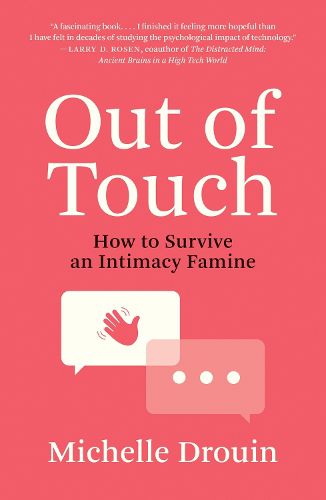Readings Newsletter
Become a Readings Member to make your shopping experience even easier.
Sign in or sign up for free!
You’re not far away from qualifying for FREE standard shipping within Australia
You’ve qualified for FREE standard shipping within Australia
The cart is loading…






A behavioral scientist explores love, belongingness, and fulfillment, focusing on how modern technology can both help and hinder our need to connect. A Next Big Idea Club nominee.
Millions of people around the world are not getting the physical, emotional, and intellectual intimacy they crave. Through the wonders of modern technology, we are connecting with more people more often than ever before, but are these connections what we long for? Pandemic isolation has made us even more alone. In Out of Touch, Professor of Psychology Michelle Drouin investigates what she calls our intimacy famine, exploring love, belongingness, and fulfillment and considering why relationships carried out on technological platforms may leave us starving for physical connection. Drouin puts it this way: when most of our interactions are through social media, we are taking tiny hits of dopamine rather than the huge shots of oxytocin that an intimate in-person relationship would provide.
Drouin explains that intimacy is not just sex-although of course sex is an important part of intimacy. But how important? Drouin reports on surveys that millennials (perhaps distracted by constant Tinder-swiping) have less sex than previous generations. She discusses pandemic puppies, professional cuddlers, the importance of touch, desire discrepancy in marriage, and the value of friendships. Online dating, she suggests, might give users too many options; and the internet facilitates infidelity-related behaviors. Some technological advances will help us develop and maintain intimate relationships-our phones, for example, can be bridges to emotional support. Some, on the other hand, might leave us out of touch. Drouin explores both of these possibilities.
$9.00 standard shipping within Australia
FREE standard shipping within Australia for orders over $100.00
Express & International shipping calculated at checkout
Stock availability can be subject to change without notice. We recommend calling the shop or contacting our online team to check availability of low stock items. Please see our Shopping Online page for more details.
A behavioral scientist explores love, belongingness, and fulfillment, focusing on how modern technology can both help and hinder our need to connect. A Next Big Idea Club nominee.
Millions of people around the world are not getting the physical, emotional, and intellectual intimacy they crave. Through the wonders of modern technology, we are connecting with more people more often than ever before, but are these connections what we long for? Pandemic isolation has made us even more alone. In Out of Touch, Professor of Psychology Michelle Drouin investigates what she calls our intimacy famine, exploring love, belongingness, and fulfillment and considering why relationships carried out on technological platforms may leave us starving for physical connection. Drouin puts it this way: when most of our interactions are through social media, we are taking tiny hits of dopamine rather than the huge shots of oxytocin that an intimate in-person relationship would provide.
Drouin explains that intimacy is not just sex-although of course sex is an important part of intimacy. But how important? Drouin reports on surveys that millennials (perhaps distracted by constant Tinder-swiping) have less sex than previous generations. She discusses pandemic puppies, professional cuddlers, the importance of touch, desire discrepancy in marriage, and the value of friendships. Online dating, she suggests, might give users too many options; and the internet facilitates infidelity-related behaviors. Some technological advances will help us develop and maintain intimate relationships-our phones, for example, can be bridges to emotional support. Some, on the other hand, might leave us out of touch. Drouin explores both of these possibilities.